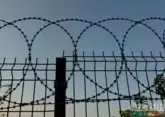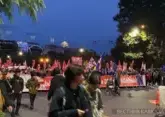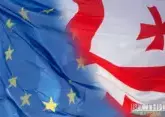It must be the weirdest political crisis of the year. A flimsy pretext has set off violent protests and a fresh confrontation between Georgia and its neighbor, Russia. Bloomberg reports on the situation in its article Is This the Weirdest Political Crisis of the Year?
On June 20, the Interparliamentary Assembly on Orthodoxy (IAO), a little-known group of Orthodox Christian legislators from about two dozen countries, held its regular general assembly at the Georgian parliament. The group’s president, Russian legislator Sergei Gavrilov, sat in the speaker’s chair and addressed the assembly in his native tongue, one of the group’s official languages alongside Greek, English and Arabic.
Georgian opposition leaders found this outrageous. The country has had no diplomatic relations with Russia since a brief war in 2008. The latter won and recognized the independence of two breakaway regions, South Ossetia and Abkhazia. However, Tbilisi hasn’t given up on the idea of getting them back someday.
Russia is toxic in Georgia’s domestic politics. During last year’s presidential elections, both leading candidates – one backed by the opposition, the other by the ruling Georgian Dream party – accused the other of Kremlin ties. In this context, a Russian legislator taking the speaker’s chair looked like surrender.
Opposition activists with links to former president Mikheil Saakashvili mobilized their supporters, and an angry mob stormed the parliament building on the night of June 20. Police responded with rubber bullets and water cannons. That was clearly a tactical mistake. One of Georgian Dream’s key criticisms of Saakashvili was the disproportionate use of violence against protesters; now the opposition can throw that right back at the ruling party.
So the government decided to make some concessions to the protesters and assert it wasn’t surrendering to Moscow. Friday saw the resignation of Irakli Kobakhidze, the speaker who had given permission for the controversial meeting in parliament. President Salome Zourabichvili broke off a foreign trip and accused Moscow of fomenting the protests. “Russia is our enemy and an occupier,” she wrote on Facebook. “The fifth column it controls can be even more dangerous today than open aggression.”
That wasn’t enough to quell the protests. Thousands still gathered in front of the parliament building every day with two demands: The resignation of the interior minister who had ordered the use of force against protesters, and an early election under proportional representation, rather than the current system where half the seats are won in first-past-the-post races.
On Monday, Bidzina Ivanishvili, the billionaire leader of Georgian Dream, agreed to hold the election under those new rules. Ivanishvili, Georgia’s richest man, has made sure his party and its candidates should do well; last year, opposition candidate Grigol Vashadze had a commanding lead in the polls, but Zourabichvili unexpectedly scored a come-from-behind victory.
While it officially favors closer ties with the European Union and the North Atlantic Treaty Organization, Georgian Dream has gradually restored economic ties with Russia. Flights between the two countries resumed and Russia lifted its ban on the import of Georgian wine, of which it is the largest consumer. In May, more than 172,217 Russian tourists, more than from any other country, visited the nation of just 3.7 million people.
After last week’s protests and Zourabichvili’s Facebook post, however, Russian authorities immediately banned flights between the two countries. On Monday, Russia’s consumer protection agency tightened checks on Georgian wine, citing a recent decline in its quality.
Despite the anti-Russian posters at the protests and the angry rhetoric, visitors from that country are as safe as ever in Georgia. No attacks have been reported, and Zourabichvili has called on Russians to keep coming.










